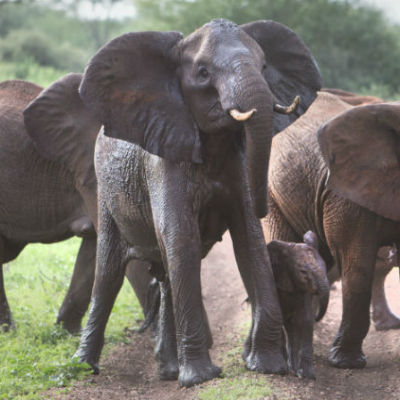Shocking footage of namibian elephant hunt prompts renewed calls for a ban
SHOCKING FOOTAGE OF NAMIBIAN ELEPHANT HUNT PROMPTS RENEWED CALLS FOR A BAN
Shocking footage of an elephant being shot by trophy hunters in Namibia has increased international calls for an end to the barbaric so-called ‘sport’.
The footage, which was reportedly taken two years ago but has been widely circulated on social media platforms over recent days, shows two men armed with rifles, who shoot at a member of what appears to be a family group of around 10 elephants, including several young, as they cross an open area of land. The targeted elephant, which had small tusks, appears to be a young adult male.
As the first shot is fired the targeted elephant separates from the group at a run, and is brought down by a further two shots, at which point the remaining members of the group start to charge the hunters who retreat quickly while trying to reload their weapons. When the elephants finally move away the hunters can be heard laughing. Throughout this time the potentially fatally wounded elephant falls and continues to struggle.
Responding to the footage, Born Free’s President and Co-Founder, Will Travers OBE, said: “These horrific images, coming as they do on the back of the news that a (now sacked) Idaho Fish and Game Commissioner had posed with a family of dead baboons he had shot while on a bloody hunting spree in Africa, brings home the sheer barbarity and cruelty of trophy hunting. Elephants are highly intelligent, social animals. For one of their kind to be executed in such a brutal and cowardly fashion in the presence of the rest of the family will have a devastating and lasting impact on the remaining animals in the group, particularly the young.
“To try and classify this kind of shameful violence as ‘sport’, or to claim it has anything to do with wildlife conservation, is completely without justification. Trophy hunting, the killing of wild animals for ‘fun’ by a small, wealthy elite, is increasingly rejected by the great majority of caring individuals. It deprives the world of some of its most iconic animals by a tiny number of people who have lost their moral compass. I fail to see any skill, courage, achievement, excitement, enjoyment or purpose in these activities, and the fact that predominantly wealthy westerners choose to spend their money in this way by killing innocent animals, and ruining the lives of countless more, profoundly saddens me.”
Many thousands of animals suffer and die every year across the globe at the hands of paying trophy hunters. In the decade to 2016, more than a quarter of a million trophy items derived from more than 300 threatened animal species were legally exported, according to data from the Convention on International Trade in Endangered Species of Wild Fauna and Flora (CITES). These included exports of more than 36,000 elephant trophies. Namibia, often held up as an example of ‘responsible’ trophy hunting by proponents, issued permits for the export of almost 2,000 elephant trophies during this period, mainly to the United States and Europe. The trophy items included everything from tusks to skins, feet, tails and ears.
In 2017, seven African countries (Cameroon, Mozambique, Namibia, South Africa, Tanzania, Zambia and Zimbabwe) issued quotas allowing hunters to target almost 1,000 elephants, with Zimbabwe responsible for more than half of the total quota. Botswana’s new administration is considering lifting its moratorium on elephant trophy hunting, so the numbers of elephants that can be targeted could rise.
Those who support or tolerate trophy hunting, including some conservation organisations, claim that the practice benefits wildlife conservation by giving wild animals a monetary value, thereby providing local people with a reason to tolerate species that might otherwise be regarded as a threat by removing animals they claim to be surplus or a problem, and by generating income which can, potentially, support wildlife protection and conservation efforts.
But the evidence for these claims simply doesn’t stack up. Research consistently shows that little if any of the often substantial fees paid by trophy hunters filters down. Trophy outfitters, foreign agencies, government departments and corrupt officials often pocket much of the proceeds. Also, hunters usually covet the largest or most impressive animals who, far from being surplus, are often key individuals within their societies. Their death at the hands of trophy hunters can have wide-ranging and devastating impacts on the stability of animal populations and the wider ecology.
Travers continued: “Trophy hunting is an outdated relic of a colonial-era obsession for killing wildlife for sport. It has no place in modern society, and certainly no role to play in any compassionate conservation programme. Wildlife managers need to recognise that every animal counts, and to find ways of funding conservation that do not involve more killing. If trophy hunters truly wished to support conservation they would put down the gun and join those of us working to find real, responsible and sustainable, compassionate solutions to our conservation challenges.”
Born Free continues to oppose all forms of hunting for sport, to persuade countries to shut down trophy hunting operations, ban the export and import of hunting trophies, and to pursue conservation programmes that recognise the intrinsic, social and ecological value of every individual.

